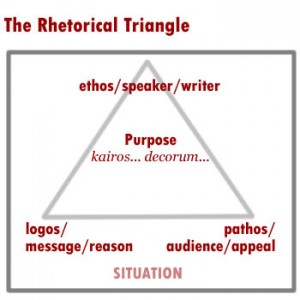Though a lot of things have changed in the field of rhetoric, most of its basic principles governing printed writing hold true in digital spaces. The first principles drilled into comp classes for First year college students are generally the “rhetorical triangle” of elements of speaker, message, and audience, which correspond with the rhetorical appeals ethos, logos, and pathos respectively . The idea is that any piece of communication that is missing any of the three elements is in serious trouble, and probably destined to fail. Similarly, arguments based only on one of the appeals (such as pathos, or emotion) are incredibly weak. The relationship between these groups of elements is illustrated as an equilateral triangle to emphasize that each element is equally important, though it’s important to realize that none of these principles of argument exist without context. And in a digital context, the same expectations traditionally held regarding audience don’t always hold true.

Classical rhetoric, for instance, draws a distinction between imagined versus actual audiences. “Imagined” audiences tend to exist in the minds of writers, and inform the process of crafting a particular argument for a particular set of people. Actual audiences might be quite similar to the audience a writer imagines, but often an author’s actual audience comes to include many types of people he/she couldn’t have expected. While this paradigm still fits, the gap between the two may be even broader in an online setting. In the age of screengrabs, very seldom is an intended audience of a message its only audience.
Take curation sites-turned-communities like the Cringe sub-Reddit or the STFU, Parents Blog (or any of the other fine STFU Tumblrs for that matter). While it’s generally frowned upon to actually spy or eavesdrop on strangers in real life, online voyeurism is not only socially acceptable, but incredibly popular. A particularly amusing example of this phenomenon is Passive-Aggressive Notes, a site where ordinary people upload the often-rude/embarrassing notes of colleagues, family members, and roommates. To wit:


Many of these communities, like Lamebook, take the whole of their content from social media. Most are Tweets, Facebook Posts, or even private messages that were intended only for one’s friends or even a particular person. Simply put, online voyeurism is huge, and nobody can guarantee that their information is private. All the privacy settings in the world won’t stop someone in your intended audience from reposting your words/photos to one of these sites.
Most of us would prefer not to become the object of these communities’ satire. So, how can a savvy user avoid becoming the butt of an unintended audience’s joke?
- Don’t write anything you wouldn’t want a family member, potential date, or employer to see. If you absolutely can’t resist, use whatever privacy settings are available. Most major social networks allow you to control your privacy settings to some degree, but also be aware that this isn’t foolproof.
- Be aware of the popular social media curation trends. Browse the tags of sites like those listed here and take a glance at the various subReddits that mock clueless users. The best way to avoid being made fun of in this setting is to not provide ammunition against yourself.
- Avoid oversharing. I’ve said it before, and I’ll say it again–every minor detail of your life is not the rest of the internet’s business.
